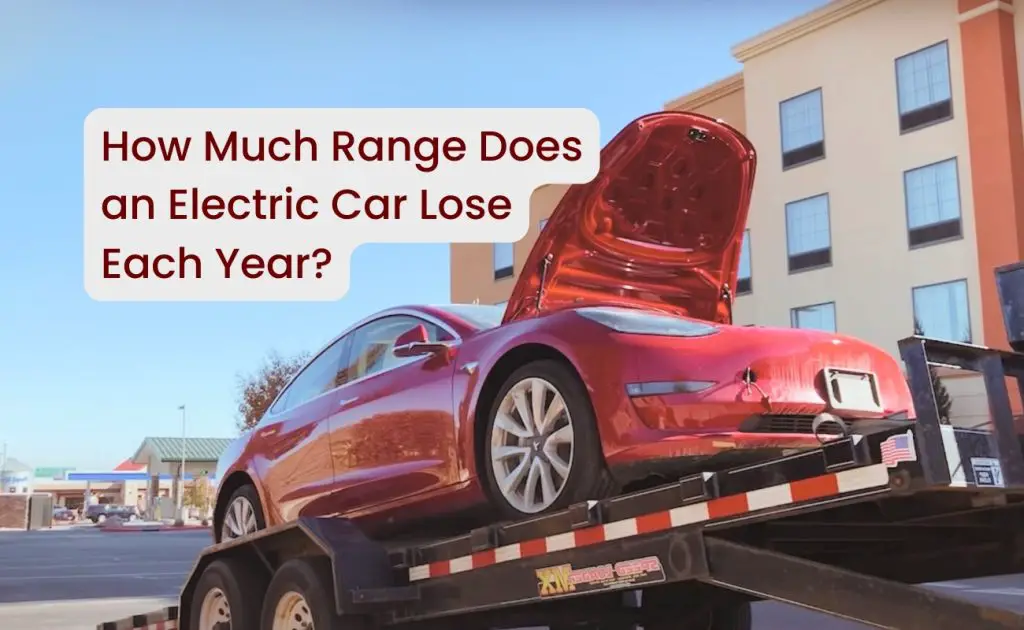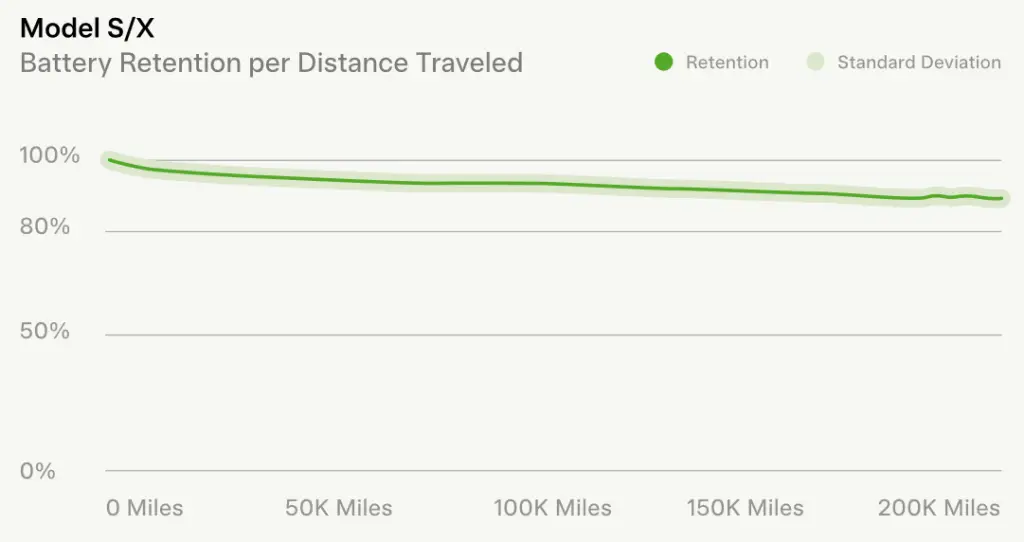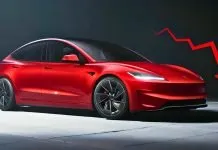Are you curious about how electric cars perform over time? Well, one of the most burning questions on everyone’s mind is just how much range these eco-friendly rides lose each year.
As with most questions, the answer is: It depends, how much your EV will lose range based on some factors!
The make and model of the vehicle, the age of the battery, and your driving habits can all play a role in determining how much range you lose. But don’t worry, we are going to give you at least some idea about the world of battery degradation. We’ve done our research and we’re ready to give you the lowdown on what to expect in this post. Read on!

Table of Contents
How Much Range Does an Electric Car Lose Each Year
As the adoption of electric vehicles continues to grow, many potential buyers are curious about the long-term performance and range of these cars. One of the most common questions is how much range an electric car loses each year.
The answer to this question can vary widely depending on several factors, including the make and model of the vehicle, the age of the battery, and the driving habits of the owner. However, we can make some generalizations based on industry data and research. Here are some factors to consider:
How Does an Electric Vehicle Battery Work?
It’s crucial to understand how electric car batteries work first. Like all batteries, they degrade over time, meaning they gradually lose their ability to hold a charge. This is due to a variety of factors, including the number of charge cycles the battery has gone through, the temperature at which it’s been stored, and the overall age of the battery.
According to an old report by the National Renewable Energy Laboratory (NREL), the average electric vehicle battery degrades by about 2-3% per year. However, this rate can vary widely depending on the specific make and model of the vehicle.
Some newer electric cars, such as the Tesla Model 3 and the Chevrolet Bolt, have batteries that are designed to degrade at a slower rate, meaning they may retain more of their original range over time.
Does Fast Charging Affect the Battery Life of EV?
While fast charging an electric vehicle (EV) does not necessarily cause accelerated battery degradation, it can increase the thermal load on the battery cell and potentially damage its internal components. This, in turn, can result in fewer lithium ions being able to transfer from the cathode to the anode, reducing the battery’s overall performance.
Despite concerns about the potential for fast charging to damage EV batteries, the amount of degradation they actually face is often not as severe as some may assume. With proper battery management systems in place and appropriate charging practices, the risk of thermal damage can be minimized, and the battery can maintain its longevity.
Driving Style Affects Electric Car Range
Another important factor to consider is how the car is used. If the owner frequently fast-charges the vehicle or lets the battery run down to very low levels, this can accelerate the rate of degradation. Conversely, if the owner takes good care of the battery and avoids harsh charging and discharging cycles, the battery may retain more of its original capacity over time.
One important thing to note is that while an electric car’s range may decrease over time, it’s unlikely that the car will become completely unusable due to battery degradation. Most electric vehicles have a range of at least 100 miles, and even if the battery degrades by 30% or more, the car will still be able to travel a significant distance on a single charge.
How Long Does Electric Car Battery Last
The longevity of an electric car battery can be influenced by a variety of factors, including patterns of use, driving conditions, and charging behaviours. However, most electric vehicle manufacturers provide a warranty of eight to ten years or a specific number of miles, whichever comes first, on their batteries.
Typically, electric car batteries can last anywhere from 100,000 to 200,000 miles before experiencing significant degradation in performance. With proper care and maintenance, including avoiding extreme temperatures and regular charging, the battery’s lifespan can be extended.
While there is no exact answer to how long an electric car battery will last, the advancements in battery technology and ongoing research and development suggest that the lifespan of these batteries will only continue to improve in the future.

In its latest Impact Report for the year 2022, Tesla published a chart that showed an estimated 12% loss in the batteries of its Model S and Model X vehicles after driving 200,000 miles. This information is sure to spark discussion and debate among EV enthusiasts and analysts, as it raised concerns about the longevity and durability of electric vehicle batteries.
Earlier, the same report for the 2019 year showed an estimated degradation of 10% loss on 200,000 miles.
Dutch professor Maarten Steinbuch conducted a period analysis of Tesla’s figures and found that the batteries experienced a rapid decay of around 5% in the first 25,000 miles, followed by a slower decay of approximately 7% in the next 175,000 miles. While this decay rate is significant, it should be noted that the batteries are still functioning at a relatively high capacity even after 200,000 miles.
On the other hand, a test conducted on a Chevrolet Volt plug-in hybrid by EV writer John Voelcker showed little to no range loss after driving 300,000 miles. While the Volt is not a fully electric vehicle like Tesla’s Model S and Model X, the results of this test suggest that with proper maintenance and care, electric vehicle batteries can last for a very long time.
It’s important to note that battery degradation is a natural process that occurs in all batteries, not just electric vehicle batteries. Factors such as temperature, usage patterns, and charging habits can all affect the rate of degradation.
Electric Car Batteries After They Die or Replaced
When an electric vehicle battery is replaced, it does not necessarily mean that the old used battery is discarded into the trash. In many cases, EV batteries can still have a significant amount of usable life left even after they are no longer suitable for use in a vehicle.
One common practice is to repurpose the battery for other applications, such as stationary energy storage. These used EV batteries can be grouped together to form large-scale energy storage systems, providing a valuable source of renewable energy.
Another option is to recycle the battery. EV batteries do contain valuable materials like lithium, nickel, and cobalt which can be extracted from used batteries and reused. Recycling the battery helps to reduce waste and minimize the environmental impact of battery production.
In some cases, the old battery may be refurbished or refurbished by the manufacturer for use in other vehicles. This process involves testing the battery’s cells and replacing any that are degraded or damaged, restoring the battery’s capacity and functionality.
The disposal of replaced EV batteries is carefully regulated to minimize waste and maximize the potential for reuse and recycling. As electric vehicles become more common, we will likely see even more innovative ways of repurposing and recycling used EV batteries in the future.
New Battery Technology for Electric Vehicles
Geotab, an Ontario-based company, is actively tracking the health of electric vehicle (EV) batteries, including those used in commercial fleets. Through its research, Geotab has found that the average battery degradation rate is around 2.3% per year.
This means that after several years of use, an EV battery’s capacity may decline by a significant amount. However, the good news is that many EV manufacturers offer battery warranties that guarantee 70% of the original capacity within the warranty period. This warranty aligns with the potential for the battery to retain up to 80% of its capacity, leaving an extra 10% safety margin to account for any variables that could lead to range loss.
Newer EV models often come with longer warranties and more advanced battery management systems, which can help to extend the battery’s lifespan and protect against unexpected repairs. By investing in a newer used EV, you can have more peace of mind knowing that you are getting a vehicle with the latest battery technology and a better chance of avoiding costly replacement costs down the road.
So, how much range does an electric car lose each year?
The answer depends on a variety of factors, but in general, most electric vehicle batteries degrade by about 2-3% per year approximately. However, this rate can vary widely depending on the make and model of the car, as well as the owner’s driving habits and charging practices. Potential electric car buyers need to do their research and consider these factors when making an EV purchase.
Bottomline
When considering the purchase of a used electric vehicle (EV), it is important to be cautious when looking at older or high-mileage options. This is because battery technology has advanced significantly over the past decade, and older batteries may not perform as well as newer ones.
As a general rule of thumb, it is better to plan your purchase accordingly and spend a little more on a newer used EV, rather than risking expensive out-of-warranty battery repairs.
As the auto industry continues to shift towards electric cars, the technology behind EV batteries is also improving. Ongoing research and development are expected to bring down the cost of replacement and increase the lifespan of electric car batteries.
With these advancements, it should become easier to understand how long these batteries will last, and more companies may be inspired to explore innovative ways of reusing and recycling EV batteries.


















